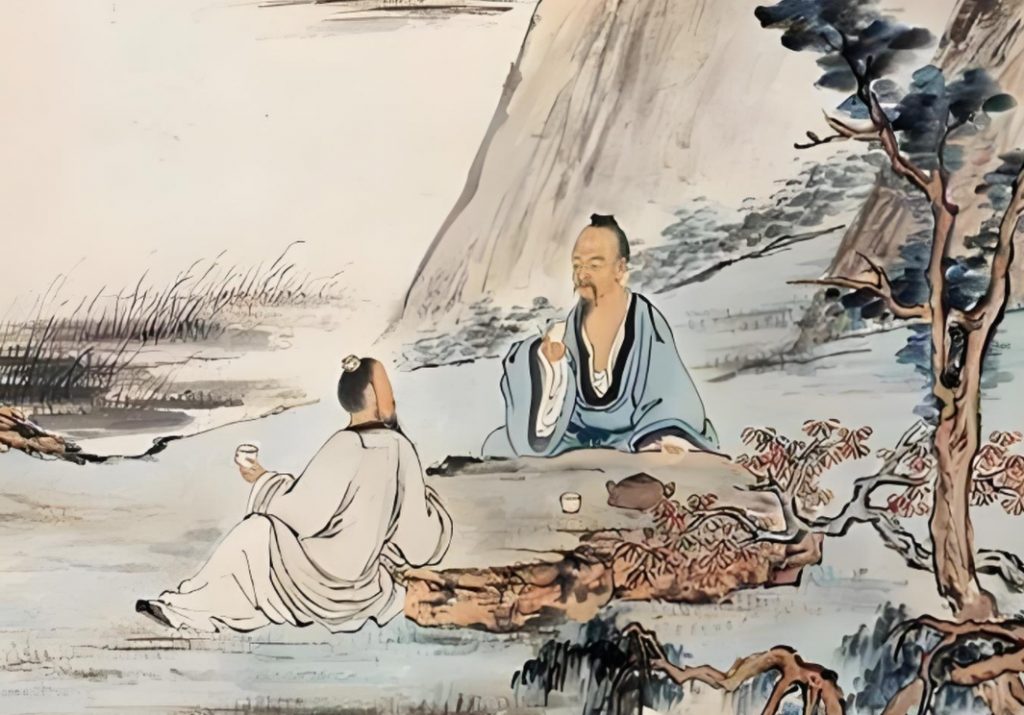Zhuangzi, a master of fables, whose life itself is a collection of profound stories. He advocates a state of freedom that transcends material and secular constraints, which is vividly reflected in the “Debate of Haoliang”. Zhuangzi stood by the bridge, gazing at the leisurely fish in the water, his heart surging with longing and joy for that unrestrained life. For him, this is not just the joy of fish, but a reflection and resonance of his ideal life state in his heart. He refused the temptation of royal power and chose the path of seclusion, just as he would rather be a turtle swimming freely in the mud than a bird imprisoned in a golden cage.
Hui Shi, as a friend and opponent of Zhuangzi, holds a completely different worldview. He firmly believes that happiness should be built on a quantifiable value system. For Zhuangzi’s so-called “joy of fish”, he finds it difficult to understand the philosophical meaning behind it, but directly questions its authenticity – how can humans understand the inner world of fish? Huishi’s questioning actually reflects his limitations in understanding things, that is, attributing all experiences to direct perception of material and spiritual aspects.

Zhuangzi, with his quick thinking, cleverly responded to Hui Shi’s questioning and raised a deeper philosophical question: If you are not me, how do you know that I do not know the joy of fish? This rhetorical question is not only a challenge to personal cognitive limitations, but also a profound insight into the interconnectedness of all things and the natural Dao. In Zhuangzi’s view, the great Tao is intangible, but it is contained in all things. There is actually an indescribable resonance and connection between humans and fish, and between things and myself. He revealed the way of survival through the fable of “The Joy of Fish” – the simplicity of the Tao, where happiness comes from inner peace and freedom, rather than external constraints of fame and fortune.
Hui Shi obviously finds it difficult to fully understand Zhuangzi’s transcendent realm. He is limited by the secular cognitive framework, tightly binding happiness and meaning to material possessions and achievements, making it difficult for him to comprehend the spiritual freedom pursued by Zhuangzi, which is “to live in harmony with heaven and earth, and to be one with all things”. Huishi’s sadness stems from his persistence in existence and his clear boundary between “existence” and “non existence”, while Zhuangzi has already surpassed these boundaries and reached the realm of “objectification”, that is, blending with all things without distinction from each other.
The various interpretations of the “Debate on Haoliang” actually point to a core point: the divergence between Zhuangzi and Huishi stems from their fundamentally different understandings of the essence of the world and the value of life. Zhuangzi pursued absolute spiritual freedom and transcendence, while Huishi focused more on the logic and order of real life. Although their positions are different, they together constitute a brilliant dialogue in the history of ancient Chinese philosophical thought, which is thought-provoking.
As for whether Hui Shi truly knew the joy of Zhuangzi knowing fish, it may not be important. Importantly, this debate itself presents a collision and exchange of different philosophical concepts, as well as a profound exploration of ultimate questions such as the meaning of life and the essence of happiness. Zhuangzi, with his unique perspective, reveals the subtle connection between the “heart” and the “way”, reminding us that true happiness and freedom often stem from inner peace and understanding of the Tao.



